Parental Anxiety: Symptoms, Triggers, And How To Overcome
Parental anxiety is characterized by parents’ persistent worries about their children’s health, well-being, and development. This anxiety commonly manifests during pregnancy, medical events, and among new parents, with prevalence rates ranging from 10-50% depending on specific circumstances, like having children with chronic conditions.
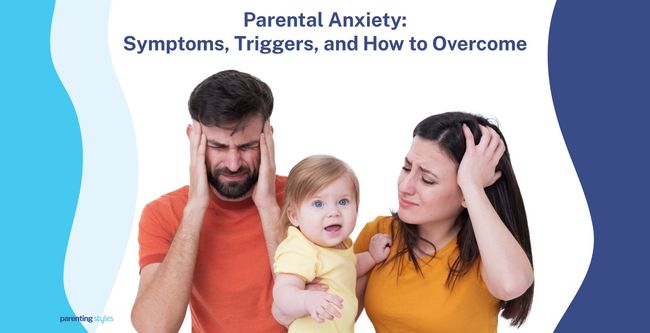
Parental anxiety significantly impacts children’s development, with research showing links between parents’ anxiety levels and their children’s emotional and behavioral issues from infancy through adolescence. Physical symptoms include increased heart rate and muscle tension. Cognitive symptoms involve intrusive thoughts and attention problems. Emotional symptoms show persistent worry. Behavioral symptoms appear as overprotectiveness.
Different parenting styles reflect parental anxiety differently. Anxious parents often display controlling or overprotective behaviors across authoritative (balanced approach), authoritarian (strict control), permissive (lenient), and uninvolved (disengaged) styles. Common anxiety triggers include children’s health conditions, developmental delays, school transitions, and social-academic performance. Primary causes stem from children’s health issues, parental mental health, brain changes, and environmental stressors like economic hardship.
The impacts of parental anxiety extend to both parents’ physical and mental health, children’s development and attachment style, parenting behaviors, and overall family dynamics. Anxious parents tend to lead children to develop anxiety through cognitive mechanisms (threat perception), behavioral mechanisms (overprotection), and emotional mechanisms (reduced emotional synchrony, which means less matching of feelings between parent and child).
Management strategies include accepting fears, gradual exposure to anxiety triggers, professional help, exercise, mindfulness meditation, and open communication with partners and children. Medications like SSRIs (drugs that increase serotonin levels in the brain) and SNRIs (drugs that increase both serotonin and norepinephrine levels) often help treat parental anxiety, though consultation with healthcare providers is essential for personalized treatment.
Parents prevent passing anxiety to their children by avoiding overprotection, teaching coping strategies, promoting self-efficacy (belief in one’s ability to succeed), demonstrating calmness, and considering family therapy, which has shown significant success in reducing anxiety transmission across generations.
What Is Parental Anxiety?
Parental anxiety refers to worries parents have about their children’s health, well-being, and development. Parental anxiety shows up in different situations, like during pregnancy, when facing a child’s medical issues, or during major life changes for the child. For instance, expectant fathers show parental anxiety through excessive worry about various aspects like birth delivery, their partner’s well-being, and financial concerns.
Parental anxiety significantly impacts the parent and the child. Parents of children with epilepsy have high levels of anxiety that cause poor life quality, according to a 2016 study titled “Parental anxiety in childhood epilepsy: A systematic review,” conducted by Chloe Jones and Colin Reilly and published in Epilepsia.
Several factors influence parental anxiety, including the child’s temperament, the parent’s mental health, and how severe the child’s condition is. For instance, parents with children who have lower activity levels and poorer mental health experience higher anxiety levels.
How Common Is Parental Anxiety?
Parental anxiety is common during medical events, throughout pregnancy, and among new parents. The prevalence rate of anxiety in parents of children with anxiety disorder is about 16%, according to a 2019 study titled “Meta-Analysis of Anxiety in Parents of Young People with Chronic Health Conditions,” conducted by Martin Pinquart, PhD and published in the Journal of Pediatric Psychology. Parents of children with neuromuscular disorders, HIV/AIDS, and cancer during active treatment show higher anxiety levels.
Parents of children with cystic fibrosis tend to report high anxiety levels, with up to 50% experiencing clinically significant anxiety, according to a 2021 study titled “Anxiety in Children with Cystic Fibrosis and Their Parents: A Systematic Review,” conducted by Hayley Kimball et al. and published in Clinical Child and Family Psychology Review.
Anxiety is prevalent during pregnancy, affecting about 10.69% of fathers during the prenatal and postpartum phases and 15% of mothers after giving birth, as noted in the 2021 study titled “Anxiety among fathers during the prenatal and postpartum period: a meta-analysis,” conducted by Jenn A. Leiferman et al. and published in Journal of Psychosomatic Obstetrics & Gynecology.
Parental anxiety is relatively common among new parents. Approximately 25% of first-time parents reported anxiety during pregnancy, which decreased to 15% after birth, according to a 2014 study titled “The Transition to Parenthood and Mental Health in First Time Parents,” conducted by Parfitt, Ylva, and Susan Ayers at City, University of London and published in the Infant Mental Health Journal.
How Does Parental Anxiety Affect Development In Children?
Parental anxiety has a notable effect on children’s development at different growth stages. Mothers’ and fathers’ anxiety levels are linked to a higher risk of emotional and behavioral issues in their children, according to a 2023 study titled “Parental anxiety and offspring development: A systematic review,” by Shaun Sweeney and Charlotte Winson, published in Journal of Affective Disorders. Researchers have found that parental anxiety negatively impacts development in a child from infancy through adolescence, with stronger connections seen during childhood and adolescence. Maternal anxiety is tied to internalizing and externalizing behavior problems in preschoolers.
Prenatal maternal anxiety is another area of concern, as it has been linked to changes in children’s brain structure and function, potentially causing behavioral issues. Research has found that neuroimaging studies found significant links between antenatal maternal anxiety and alterations in brain regions involved in emotional regulation.
The transmission of anxiety across generations sometimes happens through physiological mechanisms. For example, parental anxiety predicts autonomic hyperarousal in infants, which was associated with more fearful temperament in early childhood, according to a 2020 study titled “Intergenerational transmission of anxiety: linking parental anxiety to infant autonomic hyperarousal and fearful temperament,” conducted by Wieke de Vente et al. at the University of Amsterdam and published in The Netherlands.
What Are The Symptoms Of Parental Anxiety?
The symptoms of parental anxiety include physical, cognitive, emotional, and behavioral signs. Here are the symptoms of parental anxiety based on 4 areas of functioning.
- Physical Symptoms: Physical symptoms often include an increased heart rate, sweating, trembling, and muscle tension. Anxious individuals are hypersensitive to stimuli, resulting in more intense bodily symptoms. The body’s fight-or-flight response activates during stressful or anxiety-provoking situations, leading to symptoms such as rapid breathing, dizziness, or gastrointestinal discomfort.
- Emotional Symptoms: Parental anxiety manifests in persistent worry, fear, or irritability, with some parents feeling overwhelmed. Parents often face greater anxiety when their child appears to struggle in tasks, according to a 2013 study titled “Cognitive, Affective, and Behavioral Characteristics of Mothers With Anxiety Disorders in the Context of Child Anxiety Disorder,” conducted by Cathy Creswell et al. and published in Journal of Abnormal Psychology.
- Cognitive Symptoms: Parental anxiety leads to intrusive thoughts and difficulties maintaining focus. Anxious parents develop an attentional bias toward perceived threats, where neutral situations are interpreted as threatening. For instance, anxious parents interpret minor children’s bruises as severe injuries. Distorted cognition develops as parents expect children to perform poorly during tasks. Other cognitive symptoms include increased distractibility and attentional lapses even without triggers.
- Behavioral Symptoms: Anxious parents engage in avoidance, steering clear of situations or activities that trigger their anxiety. For example, some children are prohibited from playing outside the house to avoid fears of harm. Behavioral symptoms during parenting present as overprotectiveness, excessive reassurance-seeking, and inconsistent parenting practices.
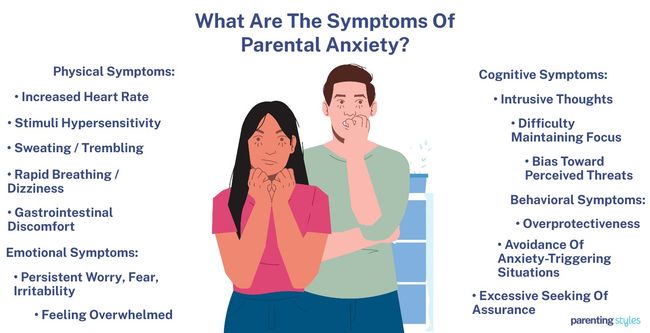
How Does Parental Anxiety Show In Different Parenting Styles?
Parental anxiety often shows in different parenting styles as controlling or overprotective behavior. Anxious parents have overprotective concerns about their children’s well-being, health, and development.
Authoritative parenting balances high responsiveness with high demands. Authoritative parents are less commonly associated with high parental anxiety. The authoritative style is characterized by warmth, support, and clear boundaries. Maternal happiness, rather than parental anxiety, was found to be associated with authoritative practices, according to a 2023 study from Israel titled “Parental worry about COVID-19 in preschool children’s mothers during the pandemic waves: The role of maternal negative feelings and parenting styles,” conducted by Yaffe, Yosi at Tel-Hai Academic College and published in the Maternal and Child Health Journal.
Some anxious parents exhibit authoritarian styles, which are marked by high demands and low responsiveness. This style often includes verbal hostility and punitive measures. Negative maternal feelings, including anxiety, were associated with authoritarian practices, according to the same COVID-19 study.
Some anxious parents adopt permissive parenting styles, characterized by high responsiveness but low demands. Permissive parenting often has a lack of structure and boundaries, potentially increasing the child’s anxiety. Parents with high sensory sensitivity, often linked to anxiety, are more likely to engage in permissive styles of parenting, according to a 2019 study titled “Sensory sensitivity and its relationship with adult attachment and parenting styles,” by Grace Branjerdporn et al., published in PloS one.
Parental anxiety sometimes manifests in an uninvolved parenting style, which is characterized by low demands and responsiveness. Parental anxiety overwhelms these parents, leading to disengagement. Some neglectful parents are preoccupied with their worries and stressors, causing emotional unavailability and withdrawal, according to a 2002 study titled “The Behavior of Anxious Parents: Examining Mechanisms of Transmission of Anxiety From Parent to Child,” conducted by Woodruff-Borden J et al. at the University of Louisville and published in Journal of Clinical Child and Adolescent Psychology.
What Are The Factors That Can Trigger Anxiety In Parents?
Factors that can trigger anxiety in parents include concerns about their children’s health, developmental milestones, transition to school, social and academic performance, and suicidal behaviors. Key factors that can trigger anxiety in parents are listed below.
- Child’s Health Condition: Parents often worry about chronic medical conditions, developmental delays, or behavioral issues in their children. Children’s hospitalization and surgery operations add to parental anxiety, which usually persists after discharge and increases during the child’s recovery period, as noted in the 2019 study titled “Parental anxiety in pediatric surgery consultations: the role of health literacy and need for information,” conducted by Georgios Kampouroglou et al. in Greece and published in Journal of Pediatric Surgery.
- Neonatal intensive care unit (NICU) Experience: Premature birth heightens parental concerns about developmental delays and infant diseases, particularly respiratory issues and sepsis. Parental anxiety usually intensifies following NICU experiences due to medical equipment sounds and restricted parent-child bonding.
- Developmental Delays: Parental concerns about speech and language delays typically arise between 2-4 years of age, a critical period for language development. Significant milestones during this time include forming short sentences, expanding vocabulary, and articulating words clearly. Delays in reaching these milestones often prompt parents to seek advice from pediatricians, speech-language pathologists, or early intervention programs. Parental concerns include limited vocabulary, difficulty combining words, or difficulty understanding or following instructions.
- Transition to School: Moving from preschool to elementary school concerns parents due to the significant adjustments involved. Parents often feel anxious about the high demands of first grade and the uncertainty of a new environment awaiting their children, according to a 2016 study titled “Adaptation in the transition to school: perspectives of parents, preschool and primary school teachers,” conducted by Karla Correia & Alexandra Marques-Pinto and published in Educational Research.
- Social and Academic Performance: Parents stress their child’s ability to make friends, fit in, and do well academically. Anxious parenting behaviors worsen the child’s social and academic struggles, creating a reinforcing cycle of stress and difficulty.
- Suicidal Behaviors: Parents experience high levels of anxiety when their adolescents exhibit severe suicidal behaviors, fearing the risk of death, according to a 2023 study titled “Parents of Adolescents Who Experience Suicidal Phenomena—A Scoping Review of Their Experience,” conducted by Demee Rheinberger et al. and published in the International Journal of Environmental Research and Public Health. Parental anxiety usually peaks when suicidal behaviors are first discovered and then subsides the following day.
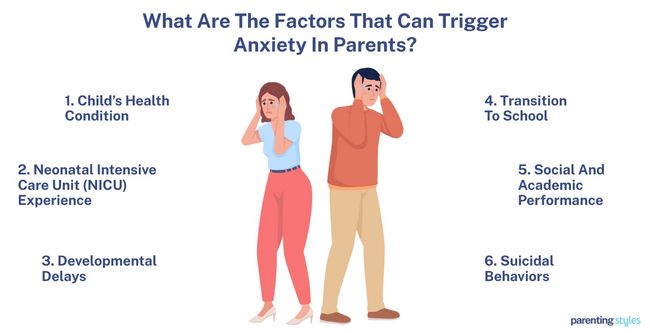
What Are The Causes Of Parental Anxiety?
Prenatal anxiety is caused by concerns about children’s health, parent’s mental health, brain abnormalities, and environmental stressors. Here are 4 causes of parental anxiety.
- Child’s Health: Parents of kids with long-term illnesses like neuromuscular disorders, HIV/AIDS, and cancer report higher anxiety levels due to uncertainty and ongoing threats. Parents of children with epilepsy experience increased anxiety.
- Parental Mental Health and Beliefs: Parents with pre-existing anxiety disorders experience higher anxiety levels when dealing with children’s health challenges. Beliefs and behaviors of parents worsen anxiety. For example, feeling overly responsible for a child’s well-being leads to more intrusive and less nurturing parenting styles, which are manifestations of parental anxiety.
- Brain Abnormalities: Elevated activity in brain regions associated with reward processing and decision-making contributes to parental anxiety following pregnancy. Increased sensitivity to infant cues like crying amplifies anxiety during the postpartum period, according to a 2019 study titled “The maternal brain and its plasticity in humans,” conducted by Pilyoung Kim et al. and published in the Hormones and Behavior Journal.
- Environmental Stressors: Economic hardship exposes parents to negative events and uncertainties, leading to elevated anxiety, according to a 2019 study titled “Socioeconomic status disparities affect children’s anxiety and stress-sensitive cortisol awakening response through parental anxiety,” conducted by Yannan Zhu et al. in China and published in Psychoneuroendocrinology. Factors like crowding, noise, and less predictable routines in daily life create stressful events that contribute to anxiety.
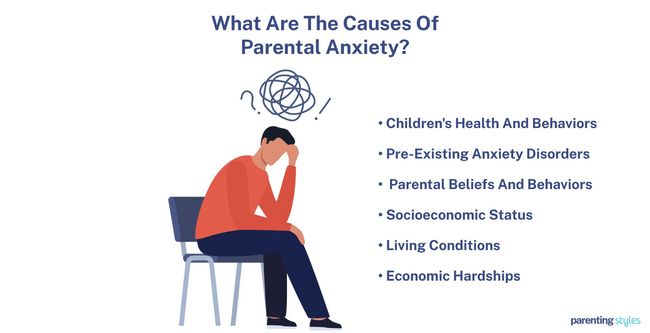
What Are The Impacts Of Parental Anxiety?
Parental anxiety impacts the parents’ mental and physical health, children’s development and attachment style, parenting behaviors, and family dynamics. The key impacts of parental anxiety are listed below.
- Parental Mental and Physical Health: Parental anxiety is linked to a higher risk of other mental health issues like depression and stress. Chronic anxiety frequently leads to poor sleep, fatigue, and a weakened immune system, which leads to physical health problems like cardiovascular diseases and gastrointestinal issues.
- Children’s Development and Well-being: Children with anxious parents face a greater risk of mental health problems, including anxiety, depression, and aggression. Paternal anxiety is linked to behavioral issues in children, showing the need to consider both parents’ mental health. Maternal anxiety during and after pregnancy often hinders early child development, resulting in negative temperament and impaired cognitive development.
- Parenting Behaviors: Anxious parents often overprotect their children, which limits opportunities for independence and growth. Anxious fathers provide more intrusive and unsolicited help, resulting in overinvolvement in the children’s lives. Anxious mothers resort to mild spanking, removal of privileges, and name-calling when confronted with anxiety-provoking situations. Children are often prohibited from playing with friends and called “chicken” during fearful situations, according to a 2013 study titled “Anxiety-Promoting Parenting Behaviors: A Comparison of Anxious Mothers and Fathers,” conducted by Rebekah N. Teetse et al. and published in Child Psychiatry & Human Development.
- Children’s Attachment Issues: Maternal anxiety creates a negative emotional atmosphere, making it harder for the child to feel safe and secure. Worries about parenting practices and separation anxiety convey fear to the child, leading to insecure attachment.
- Family Dynamics and Relationships: Increased household stress disrupts children’s behavior and emotional regulation, leading to challenges in family dynamics. Parental anxiety undermines co-parenting relationships, causing conflicts and reducing cooperation, which negatively impacts children’s well-being. Anxiety in one parent often affects the mental health of the other, perpetuating a cycle of stress and anxiety within the family.
How Do Anxious Parents Lead Children To Develop Anxiety?
Anxious parents lead children to develop anxiety through cognitive, behavioral, and emotional mechanisms. Parents with anxiety often focus on threats. Adopting a similar mindset causes children to view unclear situations as threatening, resulting in anxiety.
Behavioral mechanisms include parental behavior and verbal communication. Anxious parents are often overprotective, controlling, and fearful. Such behaviors limit children’s independence and make the world seem more dangerous, contributing to anxiety. Parents who share fear-related information or highlight environmental threats instill similar fears in children, resulting in anxiety.
Parent-child interactions contribute to the development of anxiety through dyadic synchrony, according to a 2023 study titled “Parent-to-Child Anxiety Transmission Through Dyadic Social Dynamics: A Dynamic Developmental Model,” conducted by Susan B. Perlman et al. and published in Clinical Child and Family Psychology Review. Dyadic synchrony is when a parent and a child match each other’s feelings, actions, and biological rhythms. High dyadic synchrony is associated with better emotion regulation and less parenting stress. Anxious parents show less emotional synchrony and more distress, resulting in heightened anxiety in children.
How To Overcome Parental Anxiety?
To overcome parental anxiety, accept that you’re fearful, expose yourself to the fears, and conquer them. 10 Ways to overcome parental anxiety are listed below.
- Accept That You’re Fearful: Recognize and normalize anxiety without judgment to foster self-compassion and allow negative emotions to pass quickly.
- Expose Yourself To The Fears And Conquer Them: Gradually face fears in manageable steps to reduce anxiety by building familiarity and control.
- Plan On How To Deal With Triggering Situations: Prepare specific action plans and coping strategies for triggers to minimize anxiety and avoid feeling overwhelmed.
- Get Professional Help: Seek tailored strategies from mental health professionals to manage anxiety through therapy, psychoeducation, or medication.
- Start Exercising For Self-Care: Incorporate physical activities like walking or aerobic training to reduce anxiety symptoms and enhance overall well-being.
- Practice Mindfulness Meditation: Use mindfulness techniques to increase present-moment awareness, improve self-regulation, and reduce anxiety.
- Talk To Other Parents: Build a support network with other parents to share experiences, gain perspective, and alleviate feelings of isolation.
- Communicate With Your Partner: Share concerns and parenting responsibilities with your partner to ensure emotional support and reduce stress.
- Remember To Breathe: Practice deep breathing techniques to relax the body, reduce anxiety symptoms, and focus calmly in distressing situations.
- Be Open To Your Child: Engage in open communication with your child to reduce uncertainties and provide reassurance about their experiences.
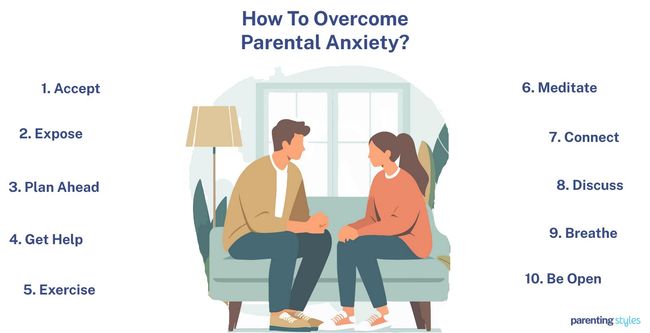
1. Accept That You’re Fearful
Acknowledging fear involves recognizing anxiety without judgment. Acceptance helps keep individuals from exacerbating or prolonging their negative emotions, allowing the anxiety to pass relatively quickly, according to a 2018 study titled “The Psychological Health Benefits of Accepting Negative Emotions and Thoughts: Laboratory, Diary, and Longitudinal Evidence,” conducted by Brett Q. Ford et al. and published in Journal of Personality and Social Psychology.
Start by recognizing that you are worried about something. Identify your concerns and reflect on their sources. For instance, write down your concerns and consider whether the worries relate to the child’s health or academic performance. Practice the approach to normalize fear and foster self-compassion.
2. Expose Yourself To The Fears And Conquer Them
Exposure therapies are widely practiced in clinical settings. Similar techniques are used at home. Facing fears diminishes the impact of anxiety by promoting familiarity and control, according to a 2015 study titled “Optimizing Exposure Therapy for Anxiety Disorders: An Inhibitory Learning and Inhibitory Regulation Approach,” conducted by Michelle Craske and published in Verhaltenstherapie journal. Facing fears repeatedly without the expected negative outcomes helps parents see the situations as less threatening.
Start by identifying small, manageable steps to address fears gradually. For example, visit the school in advance or meet the teachers if you worry about your child’s transition to school. Concerns about a child’s surgical procedure are usually addressed by talking with the doctors and being present during the administration of anesthesia.
3. Plan On How To Deal With Triggering Situations
Planning involves creating a clear action plan for specific triggers, such as a child’s hospitalization or self-harming behavior. Preparation manages parental anxiety by minimizing the element of surprise.
Start by pinpointing the situations that consistently trigger your anxiety. Identify the specific emotions you experience in the situations, such as fear or panic, and list any associated physical symptoms. Select coping strategies that work best for you and visualize the potential challenges. Make a step-by-step outline of specific actions and coping strategies to avoid overwhelming yourself. Creating a calming kit or rehearsing responses for potential scenarios are a few examples of planning.
4. Get Professional Help
Professional help for parental anxiety includes psychotherapy, psychoeducation, and medication. C Mental health professionals assist in managing anxiety by identifying subtle triggers and developing tailored strategies for parents.
Set an appointment with a psychologist or psychiatrist who focuses on parenting concerns. Prepare a list of specific challenges or goals to discuss during the session and clarify any concerns you have. Take time to understand and consider the recommended treatment options to ensure they align with your family’s needs and values. For example, cognitive-behavioral therapy sessions teach practical techniques to reframe negative thoughts and manage stress effectively. Ask for resources or exercises to practice at home between sessions for consistent progress.
5. Start Exercising For Self-Care
Exercises increase tolerance for symptoms and decrease anxiety sensitivity, according to a 2018 study titled “Exercise in the treatment of clinical anxiety in general practice – a systematic review and meta-analysis,” conducted by Elizabeth Ayllet and published in BMC Health Services Research. Physical activity treatments are relatively free from side effects and offer flexibility by accommodating parents’ working schedules without requiring time away from work.
Start exercising for self-care by running, walking, or treadmill training. Attending a supervised aerobic training session is another option. Consider taking a 20-minute walk every morning or completing 30 minutes of treadmill training three times a week.
6. Practice Mindfulness Meditation
Mindfulness meditation involves training the mind to focus on the present moment. Practicing mindfulness increases one’s awareness of thoughts and feelings. Parents experiencing anxiety benefit from mindfulness by learning to stand back from thoughts, increase insights on worries, and have better self-regulation abilities.
Consult a therapist for available mindfulness treatment programs or practice on your own using internet- and app-based interventions. Both approaches are effective in reducing anxiety, according to a 2017 study titled “Mindfulness-Based Interventions for Anxiety and Depression,” conducted by Stefan G. Hofmann and Angelina F. Gómez and published in the Psychiatric Clinics Journal.
Practice mindfulness meditation at home by focusing on breathing and slowing thoughts. Spare a few minutes daily to observe your sensations, thoughts, bodily states, consciousness, and the environment.
7. Talk To Other Parents
Connecting with other parents creates a support network and alleviates feelings of isolation. Building connections is essential for managing parental anxiety because shared experiences foster understanding and mutual encouragement. Collaborative exchanges with other parents provide fresh perspectives and validation, as noted in the 2022 study titled “Effectiveness of Parent-to-Parent Support Group in Reduction of Anxiety and Stress Among Parents of Children With Autism and Attention Deficit Hyperactivity Disorder,” conducted by Sugandha Sharma et al. and published in the Indian Journal of Psychological Medicine.
Join parenting groups or initiate conversations with other parents in similar situations. For example, share tips on managing your child’s illness or discuss coping strategies for school-related anxieties.
8. Communicate With Your Partner
Effective communication with your partner ensures emotional support. Share your worries or parenting responsibilities with your partner to alleviate concerns. Receiving help with childrearing significantly reduces anxiety among mothers who have given birth, according to a 2019 study titled “Dynamic and bidirectional associations between maternal stress, anxiety, and social support: The critical role of partner and family support,” conducted by Nicole Racin et al. and published in Journal of Affective Disorders.
Begin by expressing your fears openly. Identify arrangements that reduce anxiety effectively. For example, discuss whether attending childbirth classes together eases your concerns about parenthood.
9. Remember To Breathe
Breathing relieves anxiety-related physical symptoms by reducing the body’s fight-or-flight response and providing a distraction from anxious thoughts. Remember to breathe during distressing situations to relax your body and process information more calmly.
Place one hand on the chest and the other on the abdomen to feel the movement. Inhale deeply through the nose, allowing the abdomen to rise while keeping the chest steady. Exhale fully through pursed lips, feeling the abdomen return to its natural position. Maintain a steady rhythm and repeat the cycle to promote relaxation and focus.
10. Be Open To Your Child
Parental anxiety often stems from uncertainties about their child’s experiences. For example, parents whose children started attending elementary school worry about the challenges their children likely face. Concerns about surgical procedures arise from fears about potential outcomes for their child.
Open communication with children helps reduce emotional distance and clarifies uncertainties. Express concerns in a way that children understand and provide reassurance. For example, say, “I feel a little nervous about your first day at school, but I know you’ll do great.”
What Medications Can Be Taken For Parental Anxiety?
Medications that can be taken for parental anxiety include selective serotonin reuptake inhibitors (SSRIs) and serotonin-norepinephrine reuptake inhibitors (SNRIs), according to the American College of Obstetricians and Gynecologists (ACOG) in the 2023 study “Treatment and Management of Mental Health Conditions During Pregnancy and Postpartum: ACOG Clinical Practice Guideline No. 5.” Other medications like buspirone, pregabalin, and some tricyclic antidepressants are prescribed but not typically as first-line treatments. Benzodiazepines are usually not recommended for regular use due to risks of addiction and other negative effects. Always consult a healthcare provider to find the most suitable medication based on personal circumstances and medical history.
When To See A Doctor For Parental Anxiety?
See a doctor for parental anxiety when the anxiety is persistent, overwhelming, or disrupts daily life, according to the American College of Obstetricians and Gynecologists (ACOG). Medical attention must be sought if anxiety interferes with the ability to care for a child, physical symptoms like palpitations or insomnia arise, or managing a child’s health needs becomes difficult due to extreme worries.
Parental anxiety frequently occurs alongside depression, making early intervention and professional support necessary. Parents experiencing that their child has a serious illness despite medical reassurance are advised to consult a doctor as the symptoms signal illness anxiety by proxy, a disorder that greatly affects family dynamics.
How To Avoid Passing Anxiety On To Kids?
To avoid passing anxiety on to kids, avoid parental overprotection, teach children coping strategies, and promote self-efficacy in the child. Key strategies to avoid passing anxiety on to children are listed below.
- Avoid Parental Overprotection: Children of parents who are overprotective are more likely to develop anxiety disorders as high levels of control reduce children’s opportunities to acquire the proper development skills necessary to prevent anxiety, according to a 2021 study titled “Systematic Review of The Link Between Maternal Anxiety and Overprotection,” conducted by Lauren B. Jones et al. and published in the Journal of Affective Disorders. Setting high expectations while avoiding controlling behavior helps prevent anxiety in children.
- Teach Kids Coping Strategies: Coping strategies such as meditating, exercising, and taking deep breaths help with anxiety, according to a 2023 study titled “Breathing Practices for Stress and Anxiety Reduction: Conceptual Framework of Implementation Guidelines Based on a Systematic Review of the Published Literature,” conducted by Tanya G. K. Bentley et al. and published in Brain Sciences Journal. Practice together to benefit from calming mechanisms.
- Promote Self-Efficacy: Self-efficacy is a person’s belief in performing tasks or achieving goals. Help your child improve self-efficacy by encouraging positive self-talk. Affirm your child’s efforts, offer constructive feedback rather than criticism, and introduce achievable tasks.
- Demonstrate Calmness: Children often learn anxiety through observations and absorbing negative information, according to a 2016 study titled “Cross-generational influences on childhood anxiety disorders: pathways and mechanisms,” conducted by Eli R. Lebowitz et al. and published in the Journal of Neural Transmission. Demonstrate calmness and be mindful of showing anxiety-related behaviors to avoid passing anxiety to your child.
- Psychoeducation: Psychoeducation involves teaching parents about anxiety and effective coping mechanisms. Short video tutorials and other formats guide parents in adopting positive parenting behaviors that help children feel secure and valued.
- Consider Family Therapy: Family therapies help manage parental anxiety and enhance parenting practices. Family-based interventions cut the rate of anxiety disorders in children of anxious parents from 31% to just 5% over a year, according to a 2015 study titled “Preventing onset of anxiety disorders in offspring of anxious parents a randomized controlled trial of a family-based intervention,” conducted by Golda S. Ginsburg et al. and published in American Journal of Psychiatry.
